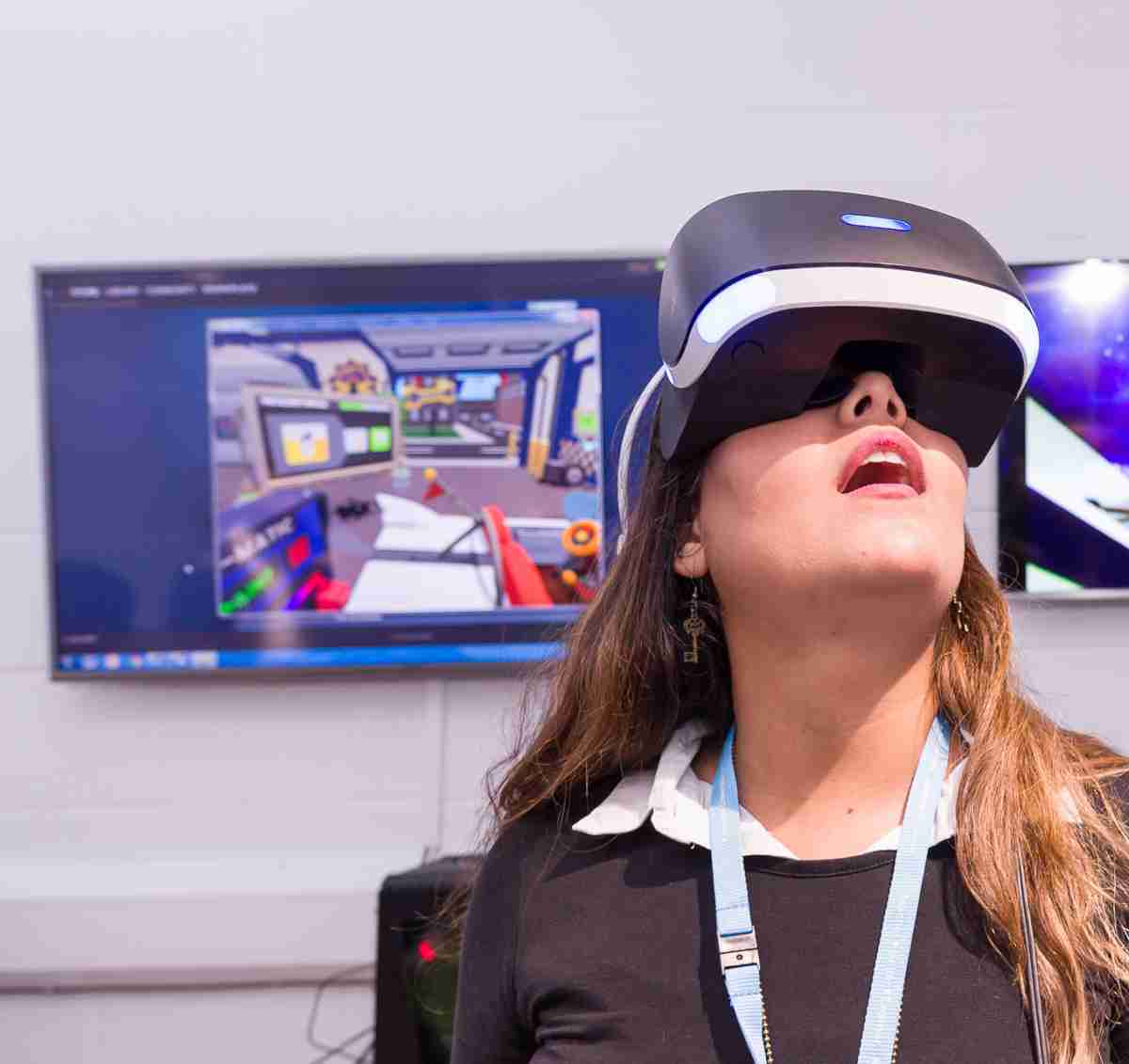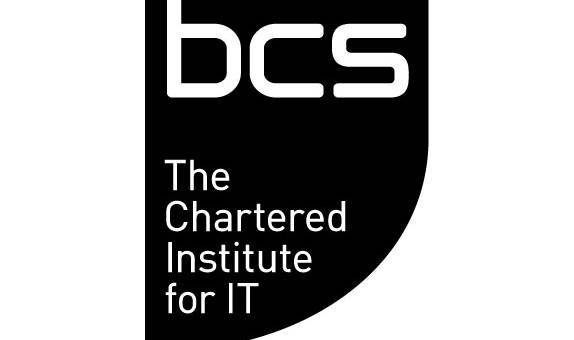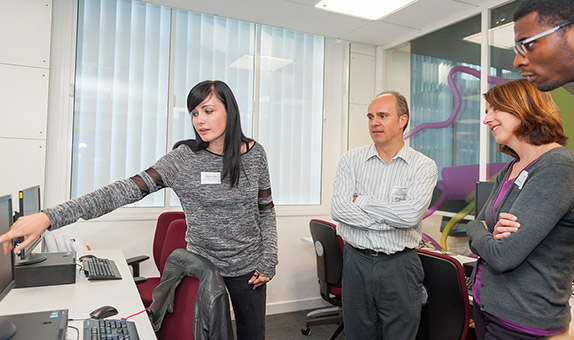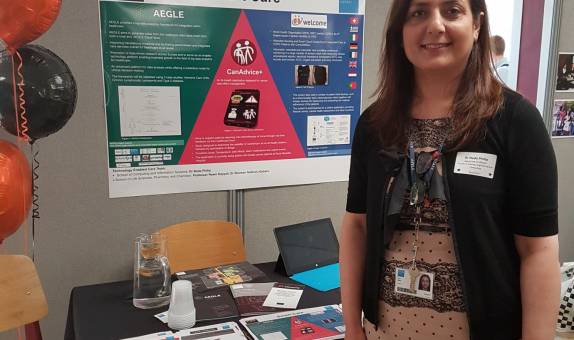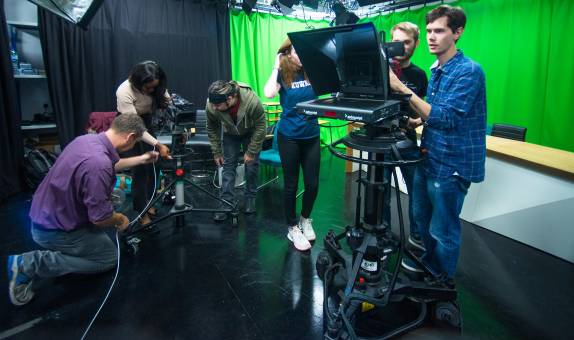Computer Games Programming BSc (Hons)

Teaching Excellence Framework (TEF) Gold award
Our commitment to high quality teaching has been recognised with a TEF Gold rating. The University has received an overall rating of Gold, as well as securing a Gold award in the framework's two new student experience and student outcomes categories.
Why choose this course?
Considering the many opportunities offered by the thriving games industry? This course is a great choice for aspiring game developers. You will create games using industry-standard game engines like Unity and Unreal across various platforms, including PC, mobile, tablet, and the Sony PlayStation 5, using programming languages such as C++ and C#. You'll also gain expertise in artificial intelligence, 3D graphics, network programming, and console development. The course will equip you with the skills to create real-time strategy, puzzle, stealth, first-person, and educational games. Additionally, the course covers essential computer science concepts like requirements analysis and computing systems.
In addition to the taught elements, you will have the opportunity to participate in game jams, hackathons, and other development competitions, alongside optional events like the UK's major game development conference in Brighton. Upon graduation, you will have a compelling portfolio, positioning you well for an exciting career in the games industry.
| Attendance | UCAS code/apply | Year of entry |
|---|---|---|
| 3 years full time | G625 | 20242025 |
| 4 years full time including sandwich year | G611 | 20242025 |
| 4 years full time including foundation year | G624 | 20242025 |
| 6 years part time | Apply direct to the University | 20242025 |
Please note: Teaching on this course may take place on more than one KU campus.
| Main location | Penrhyn Road |
Reasons to choose Kingston University
- Graduates from our course have found roles in games companies such as Rebellion, King, Sony, Mediatonic, Mojang, Rockstar, BossAlien and others
- Kingston is an educational partner of Sony through PlayStation First and you will be able to develop games for the PlayStation 5.
- In our games inKUbator, you can learn directly from the industry via our regular programme of talks. Speakers have been from Sony, Splash Damage, Rebellion, Minecraft, Aardvark Swift, Interactive Selection, CryTek and Unity.
- Our well-equipped games lab includes Sony PlayStation 5 development consoles together with the latest development software such as Visual Studio 2022, Unreal Engine 5, Unity and git as well as high-tech equipment such as gaming PCs with 12th gen Intel i7 processors, 1TB SSD drives and Nvidia GeForce RTX 3090 GPU's.
- Kingston University is ranked No.2 in London for Animation and Game Design (The Guardian University Guide 2024).
What you will study
Year 1
Year 2
Optional sandwich year
Year 3/4
In Year 1 you will develop game programming skills using the industry standard C++. Specialist modules cover 2D and introductory 3D games programming using a C++ game engine, together with the maths and physics required for game development. You will also broaden your knowledge in computing, including requirements analysis and design.
Core modules
Programming I: Thinking Like a Programmer
30 credits
We designed this module to establish a foundation for key Programming Concepts. We do not assume prior experience of programming, as we know you will all have widely different levels of existing knowledge. The module is designed to be accessible to a beginner while still being exciting for an experienced coder.
We are excited to be able to deliver this module using Kingston's own home-grown learning environment for programming, NoobLab. NoobLab gamifies your learning, making programming enjoyable and accessible for all existing ability levels – no other university offers this platform or unique approach to learning:
You will learn a variety of programming languages. In the first few weeks, we will use visual blocks that will allow you to construct programs and focus on thinking like a programmer rather than getting bogged down in grammar and syntax. Then, with these skills established, you will learn Python, Javascript and optionally Java, solving "Code Kata" style programming challenges on a weekly basis. This will equip you to build a graphical card game as your capstone project for the module.
Game Science
30 credits
The module will equip you with essential skills in mathematics and physics that are sought after and expected in the game industry. We understand that each of you may have different levels of previous preparation or skills, so we have designed the teaching materials to be accessible even if you did not excel in math during school. Moreover, all topics have been carefully selected to assist you as a programmer interested in game development. We promise not to teach any concepts unless they are directly applicable to writing games!
The module follows a "learning by doing" approach. After mastering indispensable fundamentals, you will find yourself writing code for increasingly complex games using Visual Studio, the de-facto standard C++ language, and our in-house game engine, GFC.
The module assignments, and particularly the final "Science Game", will contribute to your portfolio of games created throughout the course.
Games Programming
30 credits
We designed this module to provide an introduction to Games Programming using C++, the essential programming language of the games industry. You will be creating exciting arcade style 2D and 3D games practising your newly developed C++ programming skills, whilst making use of 2D sprites, 3D models as well as sounds and particle effects. Our in-house game engine provides an insight into the internal components of games whilst making the development process an enjoyable learning experience. The module assignments contribute to the portfolio of games that you make in your course.
Requirements Analysis and Design for Games Programming
30 credits
Good design is the key to good software, and at the heart of good software design is Requirements Analysis. This applies as much to game development as well as software design more generally.
You will learn how to identify project stakeholders and your prospective target audience of a software project, and carry out an effective stakeholder and user analysis. This will entail learning how to capture, evaluate, validate, and document requirements, using appropriate industry-standard methods, techniques, and tools with a particular focus on the games industry.
Additionally, you will learn the principles of software project management using Agile, iterative methodologies and have the opportunity to develop hands-on experience in an Agile project team.
Another key aspect of this module is learning and applying the elements of good user experience (UX) design. By the end of the module you will be able to use a prototyping tool to build wireframes, user interfaces and interactive prototypes, incorporating specific usability requirements and UX design principles. These skills will be applied when you build a high-fidelity prototype using contemporary software tools.
Furthermore, this module will introduce students to Future Skills through engagement with Navigate, a University-wide initiative to embed the future skills sought by business and the professions into our curriculum.
In Year 2 you will create games using engines such as Unity and Unreal. You will further develop your C++, C# and 3D graphics and shader programming knowledge. You will learn how to incorporate artificial intelligence (AI) in your games including for real time strategy, racer and first person games as well as more serious and educational games. Underpinning this will be the computer science concepts of computer architecture, operating systems and parallel processing as well as network communications.
Core modules
Computing Systems
30 credits
This module takes you on a journey, from underlying computer architecture through to operating systems and networking and finally on to cloud computing. We designed this module to enhance your understanding of how modern computer systems are designed and used.
You will explore the essential features of each of these technologies and acquire both theoretical and practical knowledge. In addition, you will also develop knowledge of containerisation, parallel programming and algorithm complexity to make use of new parallel and cloud computing architectures to design application scenarios for today's modern computing environments.
3D Graphics Programming and Artificial Intelligence
30 credits
This module is designed to allow you to master two pivotal techniques, artificial intelligence and 3D graphics rendering. This will serve as the cornerstone of your expertise in game development, enabling you to push boundaries by creating truly innovative and optimised game experiences. Instead of relying on high-level game engines, we will take you to lower-level programming, granting you a profound understanding of algorithms and techniques that underpin game development, regardless of which engine you happen to use.
Professional Game Development Environments
30 credits
This module teaches games programming using the two leading games engines – Unity and Unreal. In the first teaching block you will create a game in Unity, then in the second a game using Unreal blueprint as part of an agile games programming team. To make the games you will follow games industry best practice, including the use of Visual Studio and git as well as the game engines themselves.
The module stresses the importance of portfolio building to aid employability, and also the requirement to develop software in a rigorous, professional way. It is taught with an emphasis on spending time actually making games - not just learning the theory - so there are plenty of workshops on developing your practical skills.
Optional modules
Introductory Digital Media and Computer Generated Imagery
30 credits
You will learn the underlying principles of digital imaging in both its static and moving forms. The theory will be supported by workshops using professional imaging, and video editing software, as well as software tools for manipulating audio.
The CGI Foundation part introduces you to the use of a professional 3D computer graphics and animation application. You will learn how to build 3D models, shade them using assorted textures, illuminate them and render them out as images. You will learn how to make an efficient use of data, and appreciate the underlying topology of the geometry that makes up that model. Assessment will mostly be by the creation of 3D computer generated assets and presenting these as rendered images.
Database Driven Application Development
30 credits
In this module you will learn to design and build full stack web applications. The first half of the module will be dedicated to relational databases which are crucial to any company or organisation, and form the back-end persistence layer of the vast majority of modern applications. You will learn the fundamental concepts and principles of database design before moving on to building the databases and writing queries to extract data from the database.
Once you have the foundation of database development, the module will move on to teaching you to develop and deploy web based applications that use an MVC design pattern. You will learn server- and client-side development, how to access the database/persistence layer, and techniques and technologies that span the whole stack. By the end of the module you will have gained the skills to build a complex, scalable and robust web application driven by a back-end database.
User Centred Design
30 credits
This is an optional module intended for undergraduate students who are studying computing-related subjects. HCI is the core academic discipline that examines the relationship and interface between human and computer. It informs and provides the theoretical and methodological foundation for user experience, the professional discipline which is practically applied. Although this module forms part of the user experience guided pathway it can be taken as a standalone module.
You will explore major themes in HCI from both a theoretical and a practical perspective. The module will establish an understanding of key concepts within HCI theory and methods, and examines techniques for HCI design and evaluation. It offers students a practical domain in which to apply knowledge and skills, including those gained from other modules, to the design, implementation and analysis of interfaces between people and computer systems. You will undertake practical exercises in which you will evaluate real-world problems to identify user experience issues. You will utilise the synthesis of data from methods which explore user needs and requirements and also users' cognitive models to build a suite of artefacts e.g. personas, user journeys, empathy maps etc which will inform a prototyping phase. This process involves iteratively building on low, medium and high-fidelity prototypes of increasing complexity and levels of iteration. Thus you will synthesise theory and empirical data to build prototypes of a redesign solution to usability issues. These artefacts will iteratively and incrementally inform a user centred design.
Digital Motion Graphics and Compositing
30 credits
This module builds on the foundations of the Level 4 modules, in particular CI4001 and develops knowledge and skills in creating and manipulating motion graphics assets, managing the editing process and compositing multi layered as well as multi nodal visual effects. This includes still images, video, audio, paint, and video based animation and effects.
These skills are further developed to a high level of appreciation, in particular for the flow of work for digital editing and contemporary composting in 2D and 3D spaces. You will acquire knowledge, develop skills and synthesis media products for self and tutor assessment. Professional level motion graphics, editing and compositing software will be employed. Furthermore studio based green/blue screen filming will be undertaken to create original material for visual effects project work.
Multimedia Authoring and Design
30 credits
The primary aim of this module is to develop a range of skills in the creation of multimedia products, through the study and production of sophisticated content driven interactive material using industry standard multimedia authoring software. You will also be taught to write computer code (script) to a high level using a scripting language in order to generate interactive content, animation, navigation and data storage/retrieval.
Core modules
Industrial Placement
60 credits
This module is an essential course programme component for students on the sandwich route of an honours degree "with professional placement". It is a key element in providing an extended period in industry gaining real world employability skills. Students are supported both before and through their placement by the Placement Team. Students that successfully complete their placement year will graduate with a four-year sandwich degree.
In Year 3 you used an agile team-work to develop a game from initial concept to publishing stage with the aim of releasing a game on platforms such as the Google Play store or itch.io in a multidisciplinary team. You will develop skills in real-time C++ console and multiplayer game programming. In addition to the capstone project, which has a games theme, you may choose from a range of option modules.
Core modules
Multiplayer and Game Console Programming
30 credits
We designed this module to provide you with the advanced programming skills that are sought for in the game industry. The module is taught as "learning by doing" and comprises both theory taught in class and applied work in the laboratory.
First, you will create your own games by learning two important specialisms in computer games programming: low level device programming (such as for game consoles or mobile devices) and programming for networked games.
Second, you will develop your programming skills in the key language for the games industry, i.e., C++. In particular, you will practice some Unreal C++ and use the knowledge to develop an Unreal plug-in – very useful for your CV.
Third, as console manufacturers have decided to take advantage of multicores architectures to produce more and more complex games, you will exploit parallel programming models to deliver real-time performance.
Individual Project
30 credits
The Individual Project is an opportunity for you to demonstrate your skills in project management, research, analysis, critical thinking, technical skills and creativity, in relation to contemporary Media Technology.
There are a range of genres to choose from: film, motion graphics, CGI, interactive…etc. So, the Individual Project offers an ideal chance to specialize and develop in-depth knowledge and experience of a particular genre that excites you, building on your previous years of learning on the various core modules on our Media course.
The Individual Project is the capstone of your degree. Therefore, a good project will showcase your ability and aptitude for a chosen sector of the Media industry. It should form a significant part of your portfolio to impress future employers.
Game and Media Creation Processes
30 credits
In this module you will create computer games using industry-standard production and management techniques to a professional standard. Programmers and media students work together using agile team-working to collaboratively design, develop and test games with the potential to be published on app stores and game distribution platforms such as itch.io. The games will be developed using commercial game engines such as Unity and Unreal, with the artists using tools such as Maya and Photoshop.
As part of the module, industry speakers will provide unique insights into current practices and net-working opportunities and also advise on portfolio building to support your future games career.
Optional modules
Modelling and Animation
30 credits
Students taking this module will have already developed proficiency in the use of a professional 3D Modelling and Animation software application, and so will understand the principles of modelling, lighting, texturing and rendering. This module will enable them to strengthen these skills and build a portfolio of 3D computer assets and 3D animation. They will acquire additional skills such as the use of 3D sculpting software, rendering using techniques such as global illumination and image-based lighting with a high understanding and skill. Students will be able to show their modelled work as a turntable animation using different rendering techniques.
The principles of animation are introduced and students will learn how to apply these principles to 3D computer animation. This is a practical module where the majority of a student's time is spent working at a computer. Similarly, assessment is practically based with multiple choice tests to show they understand both basic and advanced theoretical techniques. Taught in common with CI5003 and cannot be taken if CI5003 has already been taken.
User Experience Design Thinking
30 credits
This is an optional module intended for undergraduate students who are studying Computing-related subjects. Although it forms part of the User Experience guided pathway it can be taken as a standalone module and previous experience of UX is not assumed. This module will focus upon the skills, methods and tools required in careers such as UX Architect, UX Designer, Service Designer, Information Architect or Digital Product Designer. The curriculum is finely balanced between theory and practice. Students are directly immersed in organisational practices and skills used in industry and will make use of academic theory in this practical context. Students will learn to develop investigative, analytical, technical, communication and advocacy skills to help them shape interactive technologies that augment people's abilities, enhance their creativity, connect them to others and protect their interests. They will also become aware of the impact of levels of digital literacy, availability of and access to technology, economic and business drivers, regulations, and regional/cultural norms. The module will also develop methods and skills required to understand current users, to investigate non-use, and to imagine future users.
Advanced Data Modelling
30 credits
This module will consolidate and build on previously acquired knowledge of databases by analysing and evaluating important issues in the database area. In addition, advanced aspects of data warehousing and data mining will be studied, encompassing the principles and commercial application of the technologies.
Mobile Application Development
30 credits
While this module provides a foundation for careers in mobile application development, mobile is becoming increasingly ubiquitous and the skills taught also have applications in UX, web development and software engineering in general. Although there are no prerequisites, it is assumed that students have acquired a general familiarity with programming and software development principles through their previous study.
The module is divided into two phases. In the first phase, students will be introduced to software development for the two major mobile platforms. This will cover development environments for these platforms, UI conventions, building and deploying simple applications. Students will then be introduced to cross platform development environments for mobile development.
In the second phase, standard frameworks for mobile web development will be introduced. The phase is organised around a practical project. Students will choose one of the platforms on which to build a mobile application of their choice. This project gives students the opportunity to specialise and explore their chosen platform in greater depth, acquiring the knowledge and proficiency to be able to design and build complex mobile apps. Students will be encouraged to publish their apps in one or both (in the case of a cross-platform app) of the two major app stores, thus providing an introduction to mobile application delivery and distribution.
Digital Entrepreneurship
30 credits
Entrepreneurship is a major driving force in creating economic growth and this module illustrates how to work in an entrepreneurial fashion. At the heart of entrepreneurship is innovation, which can come in many forms. Sometimes this can be an incremental but generally gives significant improvement to the customer. Alternatively it is a new breakthrough or transformational innovation. Incremental innovation is aimed at increasing the value of a product or service, to add more value and thereby creating new and superior value chains. Breakthrough innovation often creates new categories of product, or transforms the historical ways of doing things.
From this foundation, the module proceeds to explain how to develop a strategy, not only to satisfy the critical needs that organisations have, but also to explore the application and use of improved value chains using the concepts of corporate venturing (spin-out/intrapreneurship) and entrepreneurship (new venture creation).
However it is not simple to start a new company. Especially the tech branch is characterised by fast developments, shifts of focus and low barriers to entry, where holding back from "bleeding edge" is essential and is one of the important differentiating factors between Tech Entrepreneurship and other forms of entrepreneurship. This means that one can no longer count on "good luck", and insight, understanding, knowledge and a systematic approach all have to be learnt.
This module will convey the concepts needed for roles in analysis, consultancy and management in technology environments, plus the necessary knowledge to work successfully in an innovative company, as well as providing a good background for new venture creation (Entrepreneurship) for those considering self-employment or founding new technology firms
Software Development Practice
30 credits
This module will expand your skill set and your awareness as software industry professional, using industry-relevant tools, know-how, as well as theoretical areas. Our focus is on real-world experience, and preparing you to become a skilled graduate, regardless of the job roles you are considering or the skills you want to expand on within the computing domain.
This will empower you to become better at whichever role you are aiming at; developer, analyst, designer, project manager and so on. This is not a code-centric module; the skills in this module are more concerned with efficiently working within a software development team and managing the code produced rather than necessarily writing code yourself.
You will explore the latest practices for making more dependable, reusable and scalable software systems, and how to configure, maintain and support such systems. We will also discuss topics on software architecture, and how to select the right architecture based on the system requirements. We will also cover popular industry practices like refactoring, software measurements, DevOps, Microservices, and software testing approaches, and even a bit of Quantum computing.
The workshop activities promote collaborative learning. Within the first teaching block you will explore a specific topic or tool every two weeks. In the second teaching block, you will work as a team, taking up a role as a manager, developer, analyst, designer, security expert or tester and work on a software development case study.
Most of the topics and tools you come across in the module are linked to skills advertised as essential or desirable by software industry employers. They are also closely linked to interview questions or assessment centre activities. Overall, the main focus of this module is to equip you to become a skilled and knowledgeable IT professional capable of facing challenges, while maintaining a holistic, practical perspective on the issues at hand.
Please note
Optional modules only run if there is enough demand. If we have an insufficient number of students interested in an optional module, that module will not be offered for this course.
Foundation year
If you would like to study computing at Kingston University but are not yet ready to join the first year of a BSc (Hons) course, you can include an extra foundation year within your chosen degree. Please see the foundation year course page for details of modules.
Future Skills
Knowledge to give you the edge
Embedded within every course curriculum and throughout the whole Kingston experience, Future Skills will play a role in shaping you to become a future-proof graduate, providing you with the skills most valued by employers such as problem-solving, digital competency, and adaptability.
As you progress through your degree, you'll learn to navigate, explore and apply these graduate skills, learning to demonstrate and articulate to employers how future skills give you the edge.
At Kingston University, we're not just keeping up with change, we're creating it.

Facilities
Our games lab seats around 60 students set up for agile team working. Three pairs of large projector screens in the laboratory allow students to participate in an interactive learning experience. The lab features high performance workstations with 12th gen Intel i7 processors, 1TB SSD drives and Nvidia GeForce RTX 3090 GPUs and PlayStation 5 development kits.
Industry standard development software and tools - such as Unity 3D Professional, Unreal 5; Visual C++ and Visual Studio as well as Steam SDKs are available as well as Maya, Blender and the Adobe Creative Suite.
Specialist hardware is available such as PlayStation development kits, Steam Decks, iPads, Android phones and tablets, Raspberry PIs, high-end digital cameras (4K) and a motion capture facility.
Our dedicated team of specialist IT technicians support the labs and are always on hand to provide assistance.
Sony PlayStation First
Kingston University is an educational partner of Sony through PlayStation First. Through this partnership you will have the opportunity to learn how to develop games for the PlayStation 5 as part of this course.
The Cave
The Centre for Augmented and Virtual Environments (the CAVE) features Oculus Quest 2s, Emotiv headsets, Meta Quest 2, Meta Quest Pro, Meta Quest 3, HTC Vive Pro 2 and an Omni Treadmill.
Accreditation
This degree has been accredited by BCS, The Chartered Institute for IT. Accreditation is a mark of assurance that the degree meets the standards set by BCS. An accredited degree entitles you to professional membership of BCS, which is an important part of the criteria for achieving Chartered IT Professional (CITP) status through the Institute. Some employers recruit preferentially from accredited degrees, and an accredited degree is likely to be recognised by other countries that are signatories to international accords. This degree is accredited by BCS for the purposes of fully meeting the academic requirement for registration as a Chartered IT Professional.
This degree has been accredited by BCS, on behalf of the Engineering Council for the purposes of partially meeting the academic requirement for a Chartered Engineer (CEng). Accreditation is a mark of assurance that the degree meets the standards set by the Engineering Council in the UK Standard for Professional Engineering Competence (UK-SPEC). An accredited degree will provide you with some or all of the underpinning knowledge, understanding and skills for eventual registration as an Incorporated (IEng) or Chartered Engineer (CEng).
Entry requirements
Teaching and assessment
Scheduled learning and teaching on this course includes timetabled activities including lectures, seminars and small group tutorials.
It may also include placements, project work, workshops, workshops in computer labs, and laboratory workshops.
Who teaches this course?
The course is taught at the School of Computer Science and Mathematics.
The School of Computer Science and Mathematics is driven by the philosophy of 'learning through making'; we focus strongly on facilitating a hands-on experience, student led and owned product portfolios and producing industry-ready graduates.
We utilise a range of innovating teaching and learning approaches in our invigorated and modernised degree programmes; combining studio practices, project-based learning, and context driven lectures to facilitate an informed approach to problem solving.
Postgraduate students may run or assist in lab sessions and may also contribute to the teaching of seminars under the supervision of the module leader.
Course fees and funding
Additional costs
Depending on the programme of study, there may be extra costs that are not covered by tuition fees which students will need to consider when planning their studies. Tuition fees cover the cost of your teaching, assessment and operating University facilities such as the library, access to shared IT equipment and other support services. Accommodation and living costs are not included in our fees.
Where a course has additional expenses, we make every effort to highlight them. These may include optional field trips, materials (e.g. art, design, engineering), security checks such as DBS, uniforms, specialist clothing or professional memberships.
After you graduate
You'll be prepared for a wide range of careers in both game development and computing.
Examples of recent graduate roles:
- Games programmer
- Virtual reality game developer
- C# Programmer
- Software Developer
- Network Programmer
- Software Engineer
- Lead iOS Developer
- Junior VR Developer
- Level Designer
- Technical programmer
- App developer
Examples of recent graduate destinations
- Sony
- BossAlien
- Mediatonic
- Twistplay
- Rebellion
- Rockstar
- King
- Ubisoft
- D3T
- Splash Damage
- Rare
- IBM
- Chelsea App Factory
- Future Visual
- Infonetica
- Accenture
- Triple Play
- Thomson Reuters
- Lockheed Martin
What our students say
Computer Games Programming student James talks about his experience studying at Kingston University.
Games created by our students
Watch a compilation of demos featuring work created by our students during their time with InKUbator – the Kingston University games development studio:
Darklight
Watch a clip from Darklight, created by students during their course:
The Perfect Game
Watch a clip from The Perfect Game, created by students during their course:
Links with business and industry
Events and Lectures
inKUbator
The inKUbator provides games students with the opportunity to hear and learn from a large number of industry speakers and to work together in interdisciplinary teams to create games. Past speakers have been from Sony, Splash Damage, Aardvark Swift, Interactive Selection, CryTek and Unity.
Game Jams
We organise annual game jams, where students develop games over a 24 hour period in the games lab. These events, where students different courses meet and work together in a friendly and creative atmosphere, traditionally includes pizza! Students create games to a theme and in our most recent game jam the theme was "world peace". The most successful game was the game "Great American Punch" a Virtual Reality (VR) boxing game. Many of the games created in the game jam were then showcased at the PC Gamer Weekender in Kensington. This had a very positive write-up in the press (Techradar) as "one of the top five most impressive sights" at the event.
How we work with industry partners
The inKUbator, our game development studio, provides games students with the opportunity to hear and learn from a large number of industry speakers and to work together in interdisciplinary teams to create games. Past speakers have been from Sony, Splash Damage, Aardvark Swift, Interactive Selection, CryTek and Unity. InKUbator attracts talented students regardless of their faculty or year of study, because it provides an interdisciplinary space outside of formally taught modules.
Develop is Britain's top games industry conference at which Kingston presents an annual showcase of the top student work as part of our commitment to embed employability in the programme. One student said "I just wanted to say a huge thank you for organising students to go to Develop in Brighton! That was a huge game changer for me trying to find somewhere to work, and I ended up getting multiple job offers from people coming and chatting to us at the Kingston stand. I will be working with an Indie game team, who were also at Develop."
Kingston University is an educational partner of Sony through PlayStation First. Through this partnership you will have the opportunity to learn how to develop games for the PlayStation 4 as part of the course, and speakers form Sony and other games companies regularly feature on our course.
We also have an industrial advisory panel which meets twice a year to ensure that the course is kept up to date.
Work placement year
How you can work in industry during your course
Placements:
- provide work experience that is relevant to your course and future career
- improve your chances of graduating with a higher-grade degree
- enhance your CV
- lead to a graduate job
- enable you to earn a year's salary whilst studying (the vast majority of placements are paid)
- help you to select your final-year project.
"To be successful, tomorrow's leaders will need to be far more rounded individuals than ever before. They will collaborate in pursuit of shared goals. They will guide, challenge and support...They will have an appetite for change and a hunger for continuous improvement, and they will have an ethos of learning and development..." Jeremy Darroch, Former Chief Executive, Sky.
"Doing a placement year effectively gives you one foot in the door of a future job and to stand out from the crowd... as well as enhancing my CV... and future interviews. It's a great motivator to be successful in my studies as it only serves to open even more doors and gain more skills." Placement student at Jagex Games Studios Ltd.
There is a lot of support available for students looking to secure a placement (e.g. a jobs board with placement vacancies, help with writing CVs and mock interviews). Getting a placement and passing the placement year are ultimately the student's responsibility.
Examples of placements
Placements can be with large multinational companies, international companies, local companies and small start-ups; offering a diverse range of posts. Here are some examples of employers and roles:
| Construction-based placement employers | Construction-based placement roles |
|---|---|
| RG Group Multiplex Costain Willmott Dixon Fluor |
Assistant site manager Assistant trades package manager Assistant logistics manager Health and safety officer Construction engineer |
| Science-based placement employers | Science-based placement roles |
| Reckitt and Benckiser GSK Drug Control Centre Minton Treharne and Davies Ltd Various local and international hospitals |
Bioanalytical sciences Lab assistant Pharmacy assistant Sports coach |
| Engineering-based placement employers | Engineering-based placement roles |
| Airbus BAM Nuttall Nissan Bosch Wozair |
Analysis of aircraft structure Construction resources specialist Site engineer assistant |
| Computing and IS-based placement employers | Computing and IS-based placement roles |
| Disney Sony Interactive Entertainment Europe IBM McKinsey Intel |
Database coordinator Software developer Website developer App developer |
| Mathematics-based placement employers | Mathematics-based placement roles |
| Lloyds Banking Group AXA Allianz PAU Education, Spain |
Analyst Investment solutions Research analyst Accounts assistant |
Key information set
The scrolling banner(s) below display some key factual data about this course (including different course combinations or delivery modes of this course where relevant).
Course changes and regulations
The information on this page reflects the currently intended course structure and module details. To improve your student experience and the quality of your degree, we may review and change the material information of this course. Course changes explained.
Programme Specifications for the course are published ahead of each academic year.
Regulations governing this course can be found on our website.


